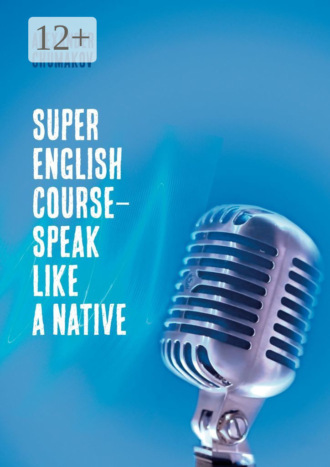
Полная версия
Super English Course – Speak like a native
As you may guess, here we use a monster as a metaphor. Let me explain to you this word, I mean, a metaphor. A metaphor is a word or a group of words we use to say that one thing or person is similar to another.
For example, every time when you hear me say, a monster or the monster I mean school. I compare School to a Monster. I say metaphorically, of course, that School is like a monster that takes children away from homes and from their parents. A very large, ugly, super-strong and cruel monster that separates parents from children. The monster that builds a wall between parents and children. The monster that takes children from their parents.
Another word we have in this lesson is to educate. And to educate means to teach someone, usually for several years. In other words, parents become teachers, right? They teach their children at home. They don’t send their children to school any more. No, no, no. They educate their children at home.
Okay, our next word is to disappear. You can see this word in the sentence, “Eventually, the monster disappears” To disappear. To disappear means to no longer happen or exist. The monster no longer exists. No one can see the monster. No one can find the monster. It stops existing. The monster disappears. It’s gone.
Next we see the word well-educated. We use this word when we describe someone who has a lot of knowledge about different subjects. For example, he is educated or she is educated. I think, you get the idea, right?
Our final word in this lesson is fulfilled. To be fulfilled or to feel fulfilled means to be happy and satisfied, especially because you are doing something important. Parents are happy. Parents are satisfied. Parents feel fulfilled. They are fulfilled because their children are well-educated. And this is the most important thing for every parent in the world.
And that is all for our vocabulary lesson for “A Monster”. If you just listen to each lesson one time, or a few times, one or two days, you will not speak English easily, confidently and automatically like a native speaker. You will be entertained, maybe. You might enjoy. You might learn a couple words, but you’re not going to learn how to speak like a native speaker. To do what you’ve got to really have this deep level of repetition. I know you’re serious about it so you’re going to do it. Good luck. Okay, I’ll see you for the mini-story.
The Mini-Story Lesson
Hello, my superstar, super-duper, wow, incredible English learner! This is Alex. Welcome to the mini-story for “A Monster”. Smile big, shoulders back, god posture, move your body. I’m not going to start this story until you are. Alright, let’s do it. And again in the present tense.
There is a huge, ugly and super-strong monster.
What is there?
There is a huge, ugly and super-strong monster.
What kind of monster is it?
The monster is huge, ugly and super-strong.
Is the monster small, handsome and super-weak?
No, not at all. The monster is huge. The monster is ugly. The monster is super-strong.
And where does the monster live?
Oh, he lives everywhere. The monster is so huge that he lives everywhere.
Does the monster live in each town, each city in each village?
Yes, he does. The monster is so huge that he lives in every town, in every city and in every village. The monster lives everywhere.
What does the monster do?
Oh, the monster does terrible, horrible and awful things.
What exactly does the huge, ugly and super-strong monster do?
It takes children away from homes.
What?
Yes, IT takes children away from homes. He takes children away from their parents.
Where does the monster take children away from?
From homes. From his parents. The monster takes children away form homes, from parents.
Does the monster take children away from homes forever?
No, not forever. It takes children from homes for 5 or 6 hours a day.
What takes children away from home for 5 or 6 hours a day?
The monster does. The monster takes children away from their homes for 5 or 6 hours a day.
Does the monster ever bring children back to their homes?
Well, actually, it does. Right! The monster always brings children back to their homes. As a result, parents see little of their children.
Do parents see much or little of their children?
Little, not much. They don’t see much of their children. They see little of their children.
How often does the monster take children from home?
Every day from Mondays till Saturdays, 6 days a week.
Does the monster take children away from homes, from their parents on Sundays?
No, it doesn’t. It never takes children away from homes, from their parents on Sundays. The monster takes children away from homes, from their parents from Mondays till Saturdays.
What does the monster give children every day? Sweets and candies, right?
No, not the monster. He never gives children sweets or candies. No!
What does the monster give children every day?
Every day the monster gives children a lot of tasks to do. And poor children and unhappy parents have to do tasks all Sundays to please the monster.
What do children and parents have to do on Sundays?
A lot of tasks. All children and all parents have to do a lot of tasks on Sundays.
Why do they have to do a lot of tasks every Sunday?
To please the monster. They have to do a lot of tasks every Sunday to please the monster; mo make him happy and satisfied; to please that huge, that ugly, that super-strong and powerful monster.
Why do children and parents have to please the monster?
Because if the monster is not glad, if the monster is not happy, if the monster is not pleased, it will take children away from their homes forever. He will never bring children back to their parents.
What will the monster do, if it is not pleased?
They monster will never ever bring children back to their parents.
Will children stay with the monster forever, if it is not pleased?
Yes, they will. Children will never come back home. They will never see their parents again.
Do parents and children spend a lot of time together now?
No, they don’t. Of course, they don’t. Parents and children don’t spend time together.
Why don’t parents and children spend time together?
Because the monster takes children away from homes for 5 or 6 hours.
Because the monster gives a lot of tasks to do. As a result, parents and children have no time to spend time together.
Do parents miss their children?
Of course, they do.
Do children miss their parents?
No doubt. They do. Parents and children miss each other a lot.
Because of what do they miss each other a lot?
Because of that huge, ugly and super-strong monster. Oh, that’s bloody monster.
What is the monster’s name? Television?
No! Not television.
The Internet?
No, not the Internet.
What is the Monster’s name?
The monster’s name is school. It is school that takes children away from homes, from their parents for 5 or 6 hours a day. It is school that gives children so many tasks to do. It is school that breaks relations between parents and children. And they don’t understand each other very well.
What is it that takes children away from homes, from their parents?
It is school. It is school that takes children away from homes, from their parents for 5 or 6 hours a day.
What is it that gives children a lot of tasks to do at home?
It is school that gives children a lot of tasks to do.
What is it that breaks relations between parents and children?
It is school that breaks relations between parents and children.
What does the school do?
The school takes children away from homes. The school gives children a lot of tasks to do.
What else does school do?
It breaks relations between parents and children.
What does school break?
Relations. The school breaks relations between parents and children. They do not understand each other very well.
Why don’t they understand each other very well?
They don’t understand each other very well because the monster breaks relations between them.
But one day parents decide not to give their children to that monster any more. They decide to educate their children at home. They also decide to spend time with their children all week.
What do parents decide to do?
Right, you are. They decide not to give their children to that monster any more.
Do parents decide to educate their children at home?
Correct. All the parents decide to educate their children at home.
Who do parents decide to educate?
Their children, of course. Parents decide to educate their children at home.
Where do parents decide to educate their children?
At home, right! Parents decide to educate their children at home. They also decide to spend time with their children all week.
Do they decide to spend time together?
Yes, they do. All the parents decide to spend time with their children all week.
What do parents decide to spend with their children together? Money?
No, not money. What is money? Time – that’s what they decide to spend together. Parents deiced to spend time with their children.
And because the monster can’t take children away from their homes any more, he gets weaker and weaker. With time the monster gets less and less powerful. And eventually, the monster disappears. It’s gone.
Does the monster get stronger and stronger with time?
No, not stronger. No, weaker. With time the monster gets weaker and weaker.
Why does the monster get weaker and weaker?
Because he can’t take children away from homes any more.
Does the monster get more or less powerful?
Less. The monster gets less powerful. With time the monster gets less and less powerful. And eventually, the monster disappears. It’s gone.
And eventually, what happens to the monster?
It disappears. The monster disappears. It stops existing. It’s gone.
Does the monster appear or does the monster disappear?
I just said. Disappears. Eventually, it stops existing. The monster disappears. It’s gone.
How do parents feel?
They feel fulfilled. Parents feel fulfilled.
Why do parents feel fulfilled?
They feel fulfilled because their children are well-educated.
And what about their children? How do children feel?
They also feel fulfilled.
Why?
Because they spend a lot of time together with their parents.
Who educates their children? The monster? The school?
No, not the monster. Not the school. Their parents do.
Are parents good teachers?
Good is not the word. They are the best teachers. Parents are the best teachers and everybody knows that.
And that is the end of our mini-story for “A Monster.” I hope you enjoyed it. Listen to the story many, many times. Remember, deep learning, deep learning, deep learning. One more time – deep learning. That means you listen to this story, this “A Monster.” lessons, all of them in this set, every day for one week, seven days. Do not go to the next lesson set. Keep learning this one. Every day over one week or for one week. Deep learning is very important. You must repeat this mini-story many, many, right times.
Right? And of course, good physiology. Smile. Shoulders back. Move your body, feel great. See you next time.
Unit 5
A Librarian
Hi, this is Alex. Are you smiling? Are you standing tall? Are moving your body? I hope so. Welcome to the lesson number 5, and today’s story is “A Librarian”. Let’s go!
Gu Gu is a huge, fat and clumsy panda. She is rude to everyone. Gu Gu the panda is a librarian at a school.
Every day she eats a huge cake. Every day she shouts at children. Every day she beats children with books. And of course, all the children and all the teachers hate her.
One day a new history teacher appears in the school. He is handsome and strong. He is intelligent. He is nice and friendly to everyone.
Gu Gu the panda falls in love with the teacher at first sight. But the teacher doesn’t want to talk to her. The teacher doesn’t want to go on a date with her. No, no, no. Why? Because Gu Gu the panda is huge, fat and clumsy. Because Gu Gu the panda is rude to everyone. And because Gu Gu the panda is a child-beater. But a few days later Gu Gu the panda decides to change. She summons up all the teachers and the children to the library. The panda says: “I am sorry. I will never be rude to you all again. I promise to be nice, kind and polite.”
She keeps her promise. Gu Gu the panda becomes nice, kind and polite to children and to the teachers. She makes compliments to everyone. She stops eating cakes. And of course, she stops beating children.
After 6 months everybody begins to love Gu Gu the panda. Everybody gives her flowers and sweets. And the history teacher asks her for a date. Wow! And of course, Gu Gu the panda is very happy.
And that is the end of the story for “A Librarian”. Next, let’s do the vocabulary lesson. Time for being free. And of course, big smile. See you next time, bye-bye.
The Vocabulary Lesson
Hi, this is Alex. Big smile… deep breath. Move that body. Liberate your body and liberate your mind. Let’s start the vocabulary lesson for “A Librarian”.
Our first word is a librarian, of course. You may know this word, but let me remind it to you. A librarian is a person who works in a library. For example, when you want to read a book. You go to a library and there is a woman. And you tell her the title of the book (the name of the book) you want to read and she gives you the book. After reading the book you go back to the library and you give the book back, you return the book. The woman takes the book from you. And this woman is a librarian, right? So Gu Gu the panda works in a library. Gu Gu is a librarian.
Next we have the word clumsy. As you remember from the story Gu Gu is clumsy. We usually use clumsy when we talk about someone who moves in a way that is not careful or graceful, and breaks things or knocks against them. So Gu Gu is clumsy because she is huge and fat. She breaks things. She knocks against them. Gu Gu is clumsy.
A little bit later we see the word intelligent. Intelligent means good at thinking clearly and quickly. When a person is intelligent it means he is good at understanding difficult ideas and subjects. So the history teacher is not only handsome and strong, but he is also good at thinking clearly and quickly. And he can understand difficult things, ideas which other people cannot. Or maybe they can, but not that quickly as the history teacher can. So the history teacher is intelligent.
Конец ознакомительного фрагмента.
Текст предоставлен ООО «Литрес».
Прочитайте эту книгу целиком, купив полную легальную версию на Литрес.
Безопасно оплатить книгу можно банковской картой Visa, MasterCard, Maestro, со счета мобильного телефона, с платежного терминала, в салоне МТС или Связной, через PayPal, WebMoney, Яндекс.Деньги, QIWI Кошелек, бонусными картами или другим удобным Вам способом.




